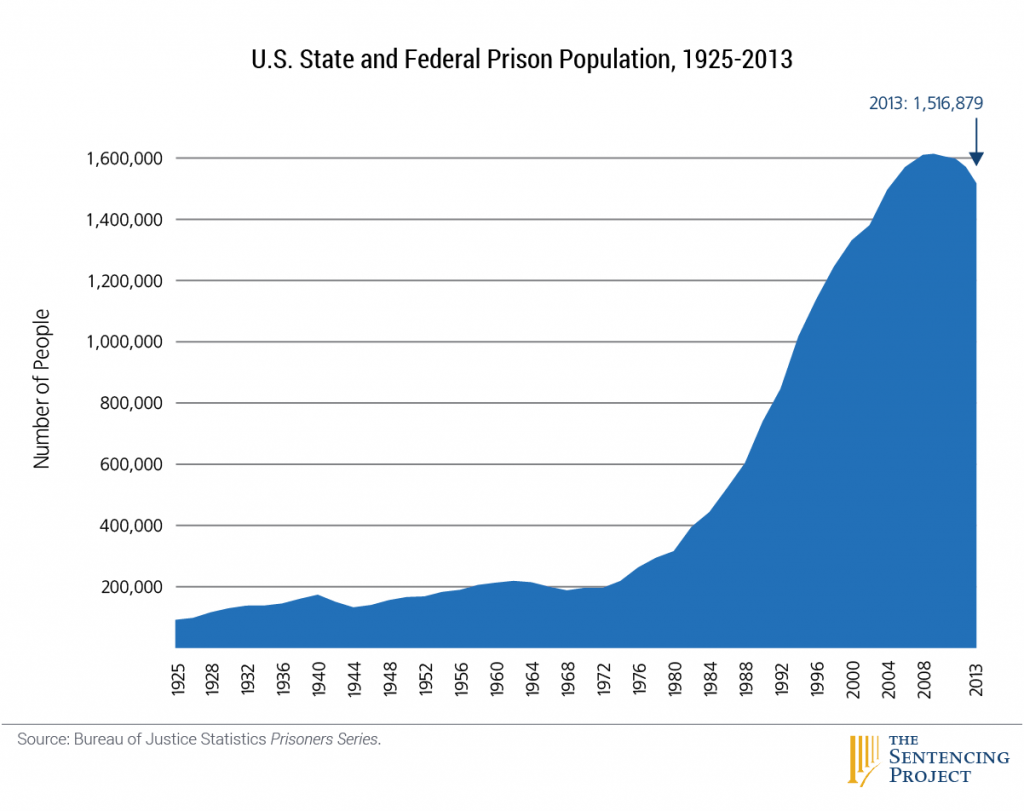One of the issues on which partisans from both the right and the left often agree is the need for reforming our criminal justice system.
For many on the right, particularly those with a libertarian bent, this goes for reform of our approach to policing all the way to sentencing and parole issues. We published a piece in this direction, The right thing to do on criminal justice reform, in the wake of the Ferguson riots. We’ve also discussed the electoral logic of Republicans and conservatives standing up against all government abuses of individuals’ rights, and not just those of parochial interest to the middle class suburban and rural GOP base. As we wrote here, “government is at its most abusive when it wields a billy club and a pair of handcuffs.”
Not everyone in the center-right coalition is comfortable with a comprehensive approach on criminal justice reform, which is fine. But where I believe we do have majority support is in the area of how we deal with non-violent offenders.
Consider the case of Weldon Angelos, a young Utah man who, under federal mandatory sentencing laws, was sentenced to 55 years in prison for selling about $1,000 worth of marijuana in three separate transactions involving undercover federal agents. Angelos admits his mistake, but the sentence bestowed on him has not only robbed him of the best years of his life, it has also taken a father away from his kids. If the goal is to reduce crime–particularly violent crime–then it should come as no surprise to conservatives that maybe wrecking families for relatively minor offenses isn’t the best way to ensure we have kids who grow up to be good, law-abiding citizens.
Conservative states like Texas and Louisiana have paved the way in dealing with these kinds of problems by adopting innovative reforms with empirically undeniable successes. The types of reforms we’ve seen at the state level have included, among other things, reversing “overcriminalization” (where the regulatory state throws people in jail for non-violent, non-fraudulent economic conduct involving otherwise legal products), addressing issues with mandatory minimum sentencing and three-strikes laws, and targeted treatment and rehabilitation programs for drug offenders. In Texas, these and other reforms had exactly the opposite effect that their critics predicted: rather than result in higher crime and higher rates of recidivism, the Texas prison population decreased by 10% (allowing the state to completely shutter three prisons and save billions of dollars) while crime decreased over the same period by 18%.
Which brings us to the federal level. Throughout 2015, news reporters marveled at the “unlikely allies” comprising the bipartisan pro-reform coalition in Congress. Led by GOP Rep. Jim Sensenbrenner and Virginia’s own Democrat Rep. Bobby Scott, this coalition has intensively studied the successes at the state level and developed a set of federal proposals embodied in the SAFE Justice Act of 2015. As Freedomworks explains, the SAFE Justice Act
[The SAFE Justice Act] offers sweeping justice reform. The bill addresses over-federalization of criminal law and over-criminalization in federal law. It focuses on sentencing reforms, many of which reflect provisions in the Smarter Sentencing Act, by creating a second “safety valve” exception to mandatory minimums to include more low-level, nonviolent offenders with little to no criminal history. It provides eligibility for resentencing under the safety valve and makes the provisions of the Fair Sentencing Act of 2010 retroactive.
The bill includes provisions designed to reduce repeat offender rates by creating risk reduction programs – such as drug and mental health treatment, education, and work training – for eligible inmates and back-end reentry programs. It requires post-sentencing risk assessments of eligible offenders and allows offenders to earn time credits upon the completion of risk reduction programs.
Speaker Boehner, conceding that we’ve got way too many people in prison on “flimsy” grounds, has said he wanted to see the SAFE Justice Act brought to the floor. Strong bipartisan majorities in both houses back the kinds of reforms embodied by SAFE Justice. On the House side, Rep. Bob Goodlatte’s Judiciary Committee has held numerous hearings and conducted multiple studies on the issue, and Goodlatte himself has made some positive noises about reform.
Yet, Goodlatte has apparently decided he’d rather pay some lip service toward reform when facing reporters, while behind the scenes working to block any action on these issues. Indeed, even Sensenbrenner has described his committee’s Chairman Goodlatte as an obstacle to reform. Perhaps to tamp down on such criticism, Goodlatte promised in early August that he and John Conyers (D-MI), ranking Democrat on the Judiciary Committee, would bring forward criminal justice reform legislation in September.
Perhaps Goodlatte hoped voters would forget about it, but we haven’t. It’s now the last day of September, and no reform legislation has been advanced by Goodlatte. Instead, what we’ve seen is more of the same attention-deflection and foot dragging, apparently in hopes that these issues will fix themselves.
They won’t. Take a look at this graph that shows the U.S. prison population over time:

This graph shows the beginning of the impact of reforms at the state level. That’s a good start. The other thing that this graph shows? We’re doing something wrong.
When we’ve got more than a million-and-a-half people in prison, that means hundreds of thousands of broken families, thousands of broken communities, and broken treasuries at both the state and the federal level. When so many of these people are behind bars for non-violent crimes, one must be willfully blind to the costs associated with mass incarceration to justify doing nothing about fixing this broken system.
I call on Bob Goodlatte to give effect to the will of a broad majority of his committee’s members, and of the American people. Remember that the story of Weldon Angelos is not a unique one, and that he is but one of hundreds of thousands of human beings who deserve better justice, which in turn helps strengthen children, families, and communities around the country–all while saving the taxpayers billions of dollars.
Congressman Goodlatte: please lead on this critically important issue NOW. Please pass the SAFE Justice Act and ensure criminal justice reform languishes no longer.

